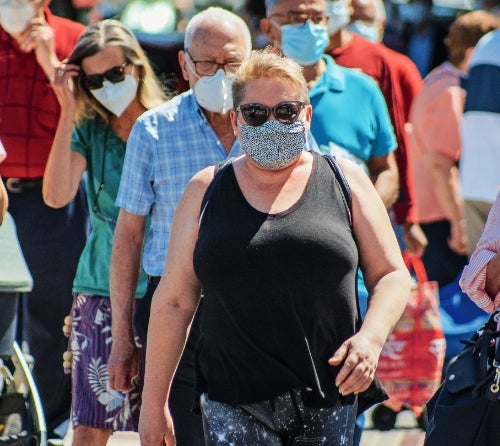UCLA Fielding Graduates Building a Healthier Future Around the World
In its six-plus decades, the UCLA Fielding School of Public Health has graduated more than 11,600 students. These FSPH alums currently live or work in 71 countries, using their degrees to build healthier futures in communities around the world. UCLA Fielding has inducted 80 of these individuals into the school’s Hall of Fame. As with so many of the thousands of FSPH graduates, their achievements have been exemplary, their impact felt far and wide. A complete Hall of Fame list appears here. Following are just a few examples, organized into the five thematic areas identified in the school’s most recent strategic plan as being among the issues of profound importance to the field of public health in the coming decade and beyond.
Infectious Diseases and Public Health
In the early months of 2020, the world learned what public health experts have long known: An infectious disease outbreak in any part of the world has the potential to reach every part of the world. For decades, alums trained at FSPH have played critical roles in identifying and quickly responding to infectious disease outbreaks.
Dr. Frederick Angulo (PhD ’95), a medical epidemiologist, studied biological threats for the U.S. Department of Defense before joining the U.S. Centers for Disease Control and Prevention, where, during his 26 years, he traveled around the world, studying outbreaks that included Ebola in West Africa and cholera in Haiti. Three years ago, he was recruited by Pfizer as a lead epidemiologist, supporting the company’s vaccine development efforts — including for COVID-19.
“The availability of vaccines for the prevention of many infectious diseases is one of the greatest advances in the field of public health,” Angulo says. “Most recently, the rapid availability of safe and efficacious COVID-19 vaccines is a noteworthy public health accomplishment. Despite the demonstrable societal value of vaccination, confidence in vaccines has declined among some populations. The UCLA Fielding School of Public Health provided me with foundational training in epidemiology to conduct observational studies to estimate the effectiveness of specific vaccines, which provide real-world evidence to support science-based discussions about vaccine use.”
 Since the earliest days of the HIV/ AIDS epidemic, UCLA Fielding has trained scores of students who have gone on to serve in leadership capacities for HIV/AIDS programs throughout the world. Within the U.S. Department of Health and Human Services, one such graduate, Dr. Myat Razak (MPH ’91, PhD ’95), leads HIV/AIDS-related capacity-building and health systems-strengthening programs globally, in collaboration with the President’s Emergency Plan for AIDS Relief (PEPFAR). Razak has held technical leadership positions in key institutions such as the U.S. Centers for Disease Control and Prevention, World Health Organization, UNAIDS, Family Health International, and Johns Hopkins University in the U.S., Asia, and Africa. He has authored peer-reviewed manuscripts, reports, and guidelines on HIV/AIDS and capacity building.
Since the earliest days of the HIV/ AIDS epidemic, UCLA Fielding has trained scores of students who have gone on to serve in leadership capacities for HIV/AIDS programs throughout the world. Within the U.S. Department of Health and Human Services, one such graduate, Dr. Myat Razak (MPH ’91, PhD ’95), leads HIV/AIDS-related capacity-building and health systems-strengthening programs globally, in collaboration with the President’s Emergency Plan for AIDS Relief (PEPFAR). Razak has held technical leadership positions in key institutions such as the U.S. Centers for Disease Control and Prevention, World Health Organization, UNAIDS, Family Health International, and Johns Hopkins University in the U.S., Asia, and Africa. He has authored peer-reviewed manuscripts, reports, and guidelines on HIV/AIDS and capacity building.
Communicating Public Health
The stakes in earning trust and crafting public health messages that reach and resonate with intended audiences have never been higher. Effectively delivering the right messages to the right recipients requires an understanding of the revolutionary changes afoot in how people receive and exchange information. For decades, FSPH graduates have successfully communicated accurate, timely, and responsible messaging with considerable impact.
Dr. D. Peter Drotman (MPH ’75) was part of a large international team that was among the last to encounter a case of smallpox, in 1975. Shortly after starting his tenure at the U.S. Centers for Disease Control and Prevention (CDC) three years later, he was assigned to investigate the initial cases of what would later be named AIDS. He went on to serve as editor-in-chief of the monthly peer-reviewed journal Emerging Infectious Diseases (EID), which began publication in 1995 as a vital component of CDC’s effort to communicate the threat of emerging infections worldwide. To ensure swift global dissemination of EID’s content, the journal is electronic, open-access, and distributed free of charge — promoting the recognition of new and reemerging infectious diseases around the world while improving the understanding of factors involved in disease emergence, prevention, and elimination.
Emily Feher (MPH ’12) has worked to improve the sexual and reproductive health and rights of marginalized workers in India, youth living in rural villages of Cameroon, and teens in Mississippi. Feher helped create Teen Health Mississippi, a youth-centered organization that provides high-quality, research-based sexual and reproductive health programs based on the principle that “all teens in Mississippi deserve access to high-quality sex education and youth-friendly healthcare to attain their highest level of health.”
 Wendy Arnold (MPH ’82) was an FSPH student when the first cases of AIDS were identified at UCLA. Arnold went on to become founder and president of the Peer Education Program of Los Angeles (PEP/ LA), which prepares multicultural youth as peer educators in HIV/ AIDS prevention in the U.S. and internationally. Established in 1990, PEP/LA has been particularly active in 13 countries in Africa. “Through community mobilization, the formation of multidisciplinary committees, and individual empowerment strategies — all learned at FSPH — these programs saved lives,” Arnold says. “I cannot thank UCLA Fielding enough for encouraging my outreach in HIV/AIDS prevention through peer education.”
Wendy Arnold (MPH ’82) was an FSPH student when the first cases of AIDS were identified at UCLA. Arnold went on to become founder and president of the Peer Education Program of Los Angeles (PEP/ LA), which prepares multicultural youth as peer educators in HIV/ AIDS prevention in the U.S. and internationally. Established in 1990, PEP/LA has been particularly active in 13 countries in Africa. “Through community mobilization, the formation of multidisciplinary committees, and individual empowerment strategies — all learned at FSPH — these programs saved lives,” Arnold says. “I cannot thank UCLA Fielding enough for encouraging my outreach in HIV/AIDS prevention through peer education.”
Data Science
In the digital age, the explosion of health information provides a treasure trove of invaluable insights that, if properly harnessed, can guide policies, programs, and practices that lead to better health. With its long-standing strength in data science, UCLA Fielding has, through the course of its history, prepared numerous graduates who have gone on to apply their expertise in a host of important ways.
In a career spanning three decades at the Los Angeles County Department of Public Health, Dr. Marc Strassburg (MPH ’75, DrPH ’81) held positions that included director of web informatics, chief epidemiologist, and director of the immunization program. He has served as a consultant for the World Health Organization in more than 25 countries in the areas of disease surveillance, eradication strategies, and public information systems, as well as consulting for the Bill & Melinda Gates Foundation, the Pan American Health Organization, and others.
Dr. Paula Diehr (MS ’67, PhD ’70) has also illustrated the impact that can be made through harnessing data to improve health. A professor emeritus of biostatistics and health services at the University of Washington, Diehr is known for her early work using data to develop diagnostic predictions for headache, community-acquired pneumonia, and ankle fracture — with her colleagues, for example, she developed The Diehr Rule to Diagnose Pneumonia in Adults as a guide to clinical decision-making for such patients.
 Dr. Stanley Lemeshow (PhD ’76) was a prominent biostatistician — focusing on statistical modeling of medical data, sampling, health disparities, and cancer prevention — when he became founding dean of The Ohio State University College of Public Health in 2003, serving in that capacity for the next decade. Indeed, FSPH alumni have started programs to train future public health leaders around the world: Dr. Nuntavarn Vichit-Vadakan (MPH ’81, DrPH ’87), for example, was the founding dean of the Faculty of Public Health and the School of Global Studies at Thammasat University in Thailand.
Dr. Stanley Lemeshow (PhD ’76) was a prominent biostatistician — focusing on statistical modeling of medical data, sampling, health disparities, and cancer prevention — when he became founding dean of The Ohio State University College of Public Health in 2003, serving in that capacity for the next decade. Indeed, FSPH alumni have started programs to train future public health leaders around the world: Dr. Nuntavarn Vichit-Vadakan (MPH ’81, DrPH ’87), for example, was the founding dean of the Faculty of Public Health and the School of Global Studies at Thammasat University in Thailand.
Health Equity
Many factors determine our health and longevity, from what we eat and how much we exercise to the genetic hand we were dealt. But at least as important are factors not traditionally associated with health, including the types of jobs and housing available to us, the quality of our education, and the extent to which we face discrimination. UCLA Fielding has long been a leader in identifying and addressing health inequities, and this commitment is reflected in the work of many of its graduates.
Since 2006, Nancy Ibrahim (MPH ’93) has served as executive director of the nonprofit Esperanza Community Housing, which works collaboratively to strengthen South Los Angeles through long-term, comprehensive community development. Ibrahim developed a model community health leadership program, Promotores de Salud, as well as successful initiatives that have included the Healthy Homes South Los Angeles collaborative, the People Not Pozos environmental justice campaign, and the STAND LA (Stand Together Against Neighborhood Drilling) coalition.
Dr. Goleen Samari (MPH ’10, PhD ’15) helped to call attention to the racialization of religious minorities and Islamophobia as a public health issue through her research, as well as in op-eds published in local and national newspapers. An assistant professor at the Columbia Mailman School of Public Health, Samari looks at how racism, gender inequities, and xenophobia and migration-based inequities shape population health both domestically and globally.
 Angela Oh (MPH ’81) was raised in California during an era when certain neighborhoods were not welcoming of her family as immigrants. As the incoming president of the Korean American Bar Association in 1992, Oh became a spokesperson and mediator during the time of social unrest in Los Angeles following the acquittal of four police officers in the beating of Rodney King. Five years later, she was named to the advisory board of President Clinton’s One America Initiative, which developed guidelines for communities to discuss how to address racial and ethnic divisions in mutually productive ways. Oh’s advice to today’s public health graduates pursuing health equity: “Enter the field with an equal measure of humility, compassion, and determination. You are correct in having great doubt about the conditions we face today; you are also right in believing that we can work together to find solutions.”
Angela Oh (MPH ’81) was raised in California during an era when certain neighborhoods were not welcoming of her family as immigrants. As the incoming president of the Korean American Bar Association in 1992, Oh became a spokesperson and mediator during the time of social unrest in Los Angeles following the acquittal of four police officers in the beating of Rodney King. Five years later, she was named to the advisory board of President Clinton’s One America Initiative, which developed guidelines for communities to discuss how to address racial and ethnic divisions in mutually productive ways. Oh’s advice to today’s public health graduates pursuing health equity: “Enter the field with an equal measure of humility, compassion, and determination. You are correct in having great doubt about the conditions we face today; you are also right in believing that we can work together to find solutions.”
Climate Change's Impact on Public Health
The existential threat posed by climate change is already inflicting substantial harms to populations around the world, with disproportionate burdens on vulnerable communities. These effects will only increase in the years ahead. In addressing the daunting challenge of reducing these impacts, FSPH draws on a long history of improving environmental health through partnerships with communities and policymakers, including the key contributions of alums to the dramatic improvements in the Los Angeles Basin’s air quality since the 1970s.
For nearly two decades, Dr. Barry R. Wallerstein (DEnv ’88) served as executive officer of the South Coast Air Quality Management District (AQMD), the regulatory agency responsible for improving air quality for large areas of Los Angeles, Orange, Riverside, and San Bernardino counties. Wallerstein, who took on the role in 1997, oversaw the development and implementation of the nation’s first local-district air toxics control plan and led the implementation of AQMD’s historic Clean Fleet Vehicle rules.
 While Wallerstein has worked to clean the air, Dr. Mark Gold (DEnv ’94) has devoted much of his career to “all things wet.” Gold served for three years as California Gov. Gavin Newsom’s deputy secretary for oceans and coastal policy. Prior to that appointment, he was the UCLA associate vice chancellor for environment and sustainability, where he helped create and lead the Sustainable LA Grand Challenge effort. Gold was also president of the environmental group Heal the Bay for 18 years. He is now focused on building climate resilience through integrated water management solutions for the increasingly arid urban California and the West. “The ongoing climate crisis has greatly exacerbated the risks of drought, flood, wildfire, sea level rise, and extreme heat,” Gold says. “Many of these climate stressors pose severe health risks to the public, especially people who live in low-income communities. Public health leaders need to strongly offer adaptation solutions and make it clear that we can’t afford to wait for mitigation to reduce ongoing climate threats.”
While Wallerstein has worked to clean the air, Dr. Mark Gold (DEnv ’94) has devoted much of his career to “all things wet.” Gold served for three years as California Gov. Gavin Newsom’s deputy secretary for oceans and coastal policy. Prior to that appointment, he was the UCLA associate vice chancellor for environment and sustainability, where he helped create and lead the Sustainable LA Grand Challenge effort. Gold was also president of the environmental group Heal the Bay for 18 years. He is now focused on building climate resilience through integrated water management solutions for the increasingly arid urban California and the West. “The ongoing climate crisis has greatly exacerbated the risks of drought, flood, wildfire, sea level rise, and extreme heat,” Gold says. “Many of these climate stressors pose severe health risks to the public, especially people who live in low-income communities. Public health leaders need to strongly offer adaptation solutions and make it clear that we can’t afford to wait for mitigation to reduce ongoing climate threats.”
